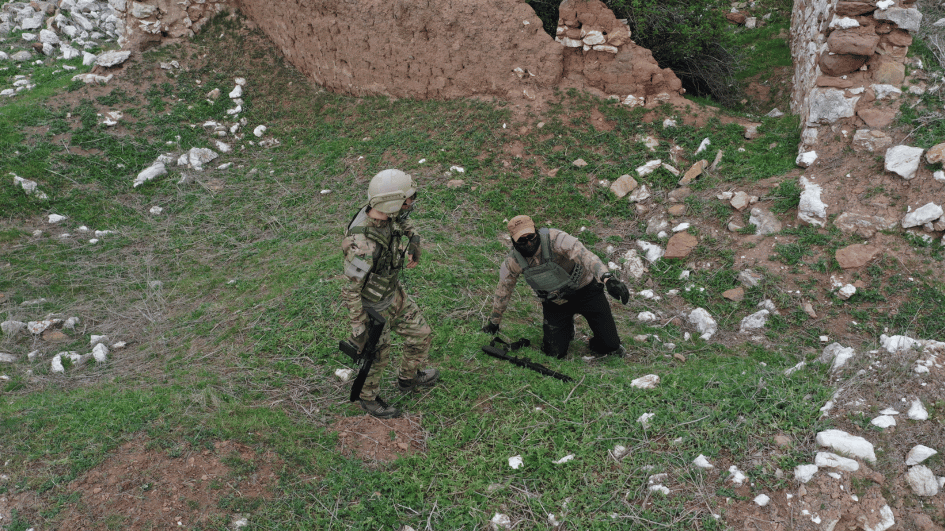Peace between Turkey and Syrian Kurds?
Turkey and Syrian Kurds have been at odds since the Kurds in northern Syria consolidated their power during the war in Syria. The relations worsened further upon the recent victories of the Syrian Kurds against the Islamic State of Iraq and the Levant (ISIL). Yet despite the two group’s reciprocal dislike, rapprochement looms on the horizon.
The Democratic Union Party (PYD) seized the town of Tal Abyad on Syria border about one month ago, which had been under ISIL control for nearly two years. In this way, Syrian Kurds secured a 250-mile border with Turkey and united two of their three cantons, namely Kobane and Cezire.
In the aftermath of this development, it has been reported that the PYD has been blocking the return of Arab and Turkmen refugees to Tal Abyad who had fled from the town during the clashes.
Highest ranks in Ankara claimed that the PYD is conducting ethnic cleansing and trying to form an independent Kurdish state along Turkey’s southern borders. President Erdoğan warned, “Turkey would never allow the establishment of a state in Syria’s north. We will continue our fight in this regard no matter what it costs.”
Moreover, officials have been comparing the PYD to ISIL, some even claiming that “the PYD is more dangerous than ISIL.”
The PYD, on the other hand, has been accusing Ankara for supporting Islamist jihadists against the Kurds in Syria.
Amidst these reciprocal accusations, I talked to a high level official in Ankara last week and shared his remarks in this column. He had displayed his want for a rapprochement with the PYD, the dominant Kurdish party in northern Syria, by saying “there is the possibility of reconciliation with PYD and a belief that their attitude will change in a positive way.”
Yet, to this end, he set three conditions: the PYD should allow the return of the refugees, haul down its flag in Tal Abyad and build its relations with local people, not along ethnic lines.
Signals of reconciliation have come also from the other front: Salih Muslim, co-president of the PYD, stated the very same day that Turkey’s concerns are unfounded and they are waiting to establish ties with Ankara.
The same desire is echoed also in Kobane, one of the three cantons of Syrian Kurds on Turkey-Syria border invaded by ISIL last December and saved in late January by Syrian Kurds with U.S. military support.
I paid a visit to Kobane last week where I had the chance to have a tête-à-tête with Enver Muslim, the co-president of the Kobane canton.
Muslim first said that they are fighting their biggest fight today since ISIL militants still infiltrate in the region and attack civilians. Thereafter, he emphasized that the PYD doesn’t pose any threat and challenge against Turkey and that they haven’t harmed the country in any way.
He also added that they are not seeking to found an independent Kurdish state, but want a free and democratic Syria for all people.
Muslim complained that conflicting voices are rising from Ankara vis-à-vis the PYD: “Some politicians think positive about the Syrian Kurds. For example, Prime Minister Ahmet Davutoğlu sent his compliments to our soldiers. That was very nice.” Here, he refers to Davutoğlu’s statement during a congress of the AKP in the southeastern province of Diyarbakır on January 25, in which he said, “I embrace my brothers from Kobane. The people of Kobane are entrusted to us by history.”
“Yet”, Muslim said, “Some other politicians make negative statements. For example they argue that the PYD is more dangerous than ISIL. I wish they hadn’t said that. Yet, we have hope Ankara won’t think along these lines anymore.”
Muslim also sent a strong message of cooperation: “We are fighting against ISIL. If ISIL gets the upper hand here, it could move to Turkey. It is a threat to all of us since it doesn’t know any borders. We could fight against it together with Turkey.”
Last but not least he added, “At the moment, we have some dialogue with Ankara about border and trade issues. Yet our relations are not strong at all. We want them to become stronger in the future. We also support the peace process in Turkey. If there is any demand from Turkey, we are ready to improve our relations.”
This all indicates that rapprochement is not only feasible, but also highly possible. All that is needed is the PYD to pass through the litmus test of Ankara by not excluding other ethnicities in the region.











